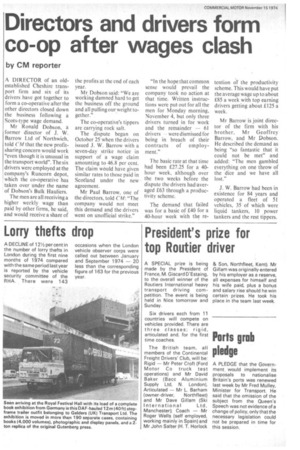Directors and drivers form co-op after wages clash
Page 20

If you've noticed an error in this article please click here to report it so we can fix it.
by CM reporter
A DIRECTOR of an oldestablished Cheshire transport firm and six of its drivers have got together to form a co-operative after the other directors closed down the business following a Scots-type wage demand.
Mr Ronald Dobson, a former director of J. W. Barrow Ltd of Northwich, told CM that the new profitsharing concern would work "even though it is unusual in the transport world". The six drivers were employed at the company's Runcorn depot, which the co-operative has taken over under the name of Dobson's Bulk Hauliers.
The men are all receiving a higher weekly wage than paid by other firms, he said, and would receive a share of the profits at the end of each year.
Mr Dobson said: "We are working damned hard to get the business off the ground and all pulling our weight together."
The co-operative's tippers are carrying rock salt.
The dispute began on October 25 when the drivers issued J. W. Barrow with a seven-day strike notice in support of a wage claim amounting to 46.8 per cent. The claim wOuld have given similar rates to those paid in Scotland under the new agreement.
Mr Paul Barrow, one of the directors, told CM: "The company would not meet this demand and the drivers went on unofficial strike." "In the hope that common sense would prevail the company took no action at that time. Written instructions were put out for all the men for Monday morning, November 4, but only three drivers turned in for work and the remainder — 61 drivers were dismissed for being in breach of their contracts of employment."
The basic rate at that time had been £27.25 for a 40hour week, although over the two weeks before the dispute the drivers had ;averaged £63 through a productivity scheme.
The demand that failed was for a basic of £40 for a 40-hour week with the re
tention of the productivity scheme. This would have put the average wage up to about £85 a week with top earning drivers getting about £125 a week.
Mr Barrow is joint director of the firm with his brother. Mr Geoffrey Barrow, and Mr Dobson. He described the demand as being "so fantastic that it could not be met" and added: "The men gambled everything on one throw of the dice and we have all lost."
J. W. Barrow had been in existence for 84 years and operated a fleet of 51 vehicles, 35 of which were liquid tankers, 10 power tankers and the rest tippers.




































































































